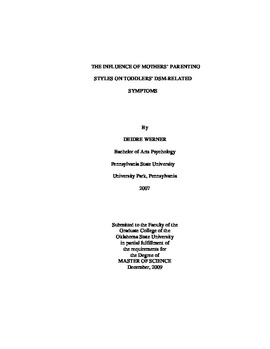| dc.description.abstract | The purpose of this study is to assess the extent to which mothers' parenting influences later child symptomology as assessed by the DSM-oriented scales of the Child Behavior Checklist (CBCL/1?-5; Achenbach & Rescorla, 2000). Many studies have shown that child personality and health outcomes vary by parenting style (e.g., Steinberg, 2001). However, there is minimal information pertaining to how parenting styles are related to potential diagnostic outcomes for children, especially for young preschoolers. Campbell, Shaw and Gilliom (2000) state that child behavior problems such as impulsivity, hyperactivity, aggression and noncompliance are more likely when there is a poor mother-child relationship. This dysfunctional relationship is marked by ineffective discipline and limited maternal warmth which are characteristics of either authoritarian or permissive parenting styles, or both (Campbell et al., 2000). Authoritarian parents are lower in warmth and likely to be ineffective due to harsher disciplinary techniques. Permissive parents are more likely to be ineffective and inconsistent in their parental discipline (Campbell et al., 2000; Harnish, Dodge, & Valente, 1995; McLoyd, 1998; Patterson, Debaryshe, & Ramset, 1989). Gross, Sambrook, & Fogg state that the parent-child relationship is the most important environmental influence on behavior problems in children, especially in the preschool years (1999). Although much of the research focuses on behavioral problems in older children, there is a need to understand the development of disorders in preschool age children, especially to inform early interventions. Negative or positive parent-child interactions that lead to childhood disorders are already apparent by four years of age. Earlier identification could benefit parents and practitioners by allowing for the use of preventative interventions. Therapeutic insight may also be gained by understanding the link between parenting styles and DSM-related child symptoms which can influence further research and interventions (Smith, Calkis, Keane, Anastopoulos, & Shelton, 2004). Keenan, Shaw, Delliquadri, Giovannelli, and Walsh (1998) suggest that the developmental precursors that are associated with behavioral and emotional problems can be identified within the first two years following birth and that problems recognized within the first year may predict future disorders (Keenan et al., 1998). This research suggests that mothers' parenting styles may be a key influence of child outcomes such as affective disorders, anxiety problems, oppositional defiance, pervasive developmental problems and attention deficit and hyperactivity symptoms (e.g., Campbell et al., 2000; Harnish, Dodge, & Valente, 1995; McLoyd, 1998; Patterson, Debaryshe, & Ramset, 1989). A more in-depth understanding of the association between parenting styles and DSM-related outcomes is needed in order to enhance the accurate dissemination of knowledge to the general public as well as to inform therapeutic treatment of families and to guide appropriate interventions. The goal of this study therefore examines the relationship between parental styles and DSM-related symptoms in toddlers from 18 to 30 months of age. Data from this study will assess correlations between parental styles and child outcomes. Regression analyses will also be used to assess which relationships are most significant after controlling for other parenting styles. The analyses will also investigate whether parenting styles predict changes in DSM-related symptoms after controlling for initial scores on the same scales. This will provide stronger causal evidence than correlations, although it will fall short of being causally definitive. Better understanding of these relationships will help clinicians and researchers help parents combine parental discipline and nurturance in a way that will facilitate their children's optimal development. | |
